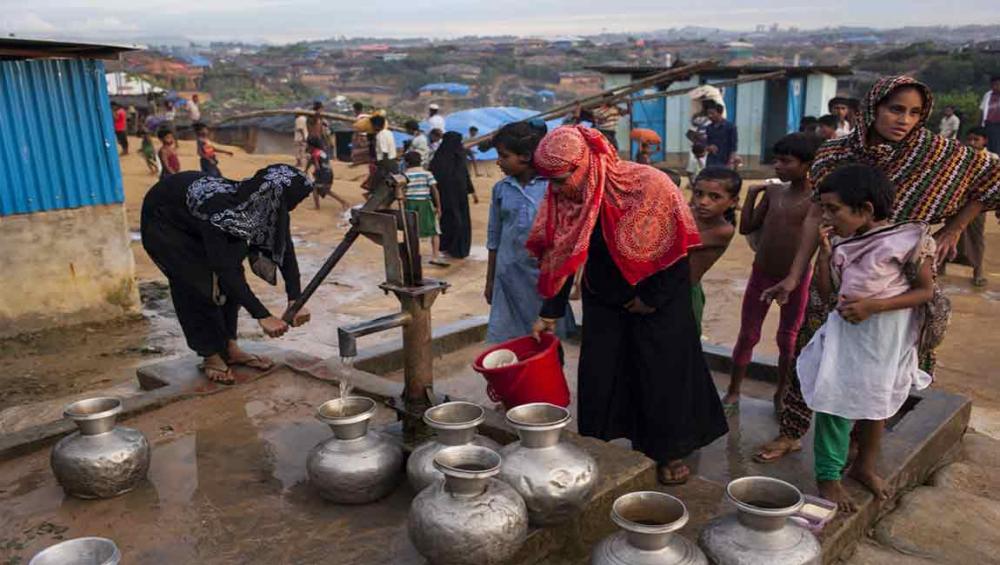Just Earth News | @Just Earth News | 22 Nov 2017, 04:17 am Print

UNICEF/Brown
New York, Nov 22(Just Earth News): The United Nations Children's Fund (UNICEF) is working with authorities in Bangladesh to urgently investigate high levels E.coli contamination in water drawn from wells inside the Rohingya refugee camps in Cox's Bazar.
“The latest figures from the World Health Organization suggest that 62 per cent of water available to households is contaminated,” UNICEF spokesperson Christophe Boulierac told reporters On Tuesday at the regular press briefing in Geneva.
“We are also concerned by an increase in cases of acute watery diarrhoea (AWD) which have included several deaths,” he added.
Between 25 August and 11 November 2017, a total of 36,096 AWD cases were reported, –including 10 related deaths – 42 per cent, or 15,206, of which were children under age five.
“We are seeing an upward trend in infection rates. Whilst the exact cause of increased cases of AWD remains uncertain, it may be linked to contaminated food or water, Boulierac elaborated.
Some of the wells inside the camps were dug too shallowly, less than 40 meters deep; have been poorly sited; and are very congested with no safeguards to prevent bacterial contamination at ground level.
“Contamination may be being caused through poor hygiene practices, such as the use of dirty containers [and] bad hygiene habits of the population in water handling,” the spokesperson said.
UNICEF and the Bangladesh authorities are investigating levels of contamination to ensure better construction practices for tube wells that meet international standards and have an appropriate ceiling.
“We are stepping up measures to distribute water purification tablets to provide for water treatment at the household level as well as promoting good hygiene practices,” he said, noting that providing safe drinking water has been one of UNICEF's highest priorities in responding to the Rohingya refugees' needs.
Smaller settlements at risk of being overlooked
Since 25 August, some 622,000 refugees fleeing violence in Myanmar have sought refuge in Cox's Bazar – bringing the total number of refugees there to an estimated 834,000.
As international attention focuses on the main Kutupalong and Balukhali settlements, the thousands who have settled in smaller villages in the southern part of the district risk being excluded from humanitarian aid programmes, the International Organization for Migration (IOM) said.
Access to clean water is also a major concern across all the locations, particularly as the dry season approaches. Aid agencies providing water, sanitation and hygiene (WASH) services are racing to identify solutions to this potentially life-threatening problem.
Although most are in the main settlements, 22,067 refugees live in Shamlapur, with 16 people sharing one latrine that are mostly full or dangerous; 22,130 in Leda, which has only one latrine per 47 people – well below the humanitarian 'Sphere' standard of one per 20 people; and 29,915 in Unchiprang, where there is also only one well per 57 people. This totals more 74,000 Rohingya refugees in all.
Many are contaminated with E.coli or are too shallow to provide enough clean water for the population through the dry season.
IOM emergency managers say that the three sites urgently need to be developed, including providing vital infrastructure – access roads, lighting and waste management.
“Most of the temporary pit latrines are full. With little to no land for de-sludging, they are becoming unusable and a danger to communities living nearby,” said IOM WASH specialist Stephen Waswa Otieno.
- Pakistan: Police recover two bullet-ridden bodies from Balochistan
- IDF strikes Hezbollah targets in Lebanon after projectile fire toward Northern Israel; 31 killed
- Pakistan: Armed gunmen kidnap 14 workers during coordinated raids in Balochistan
- ISIS-inspired plot foiled in UK: Two men get life sentences for targeting Jewish community
- India rejects allegations, urges Pakistan to tackle its ‘home-grown ills’





-1763561110.jpg)
